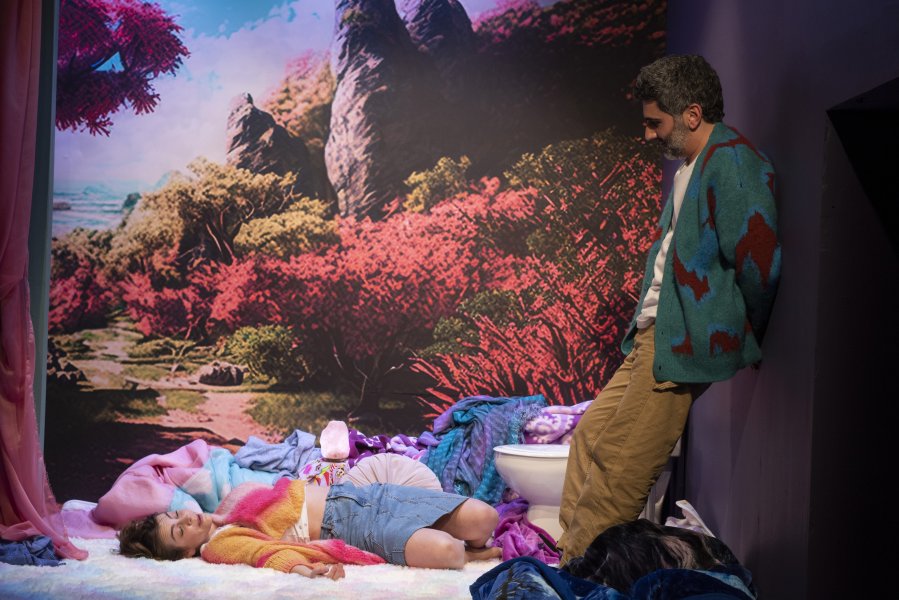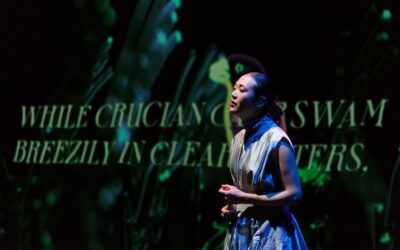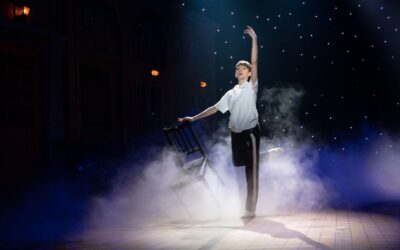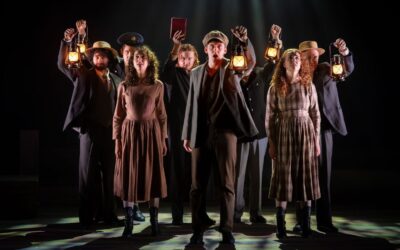By Anna Hayes
Red Stitch Theatre is the venue for the Australian premiere of U.S. playwright Clare Barron’s challenging work ‘Shhh’, a play that explores the concept of consent through a number of different characters.
The play follows a relatively loose narrative, taking the form of a string of vignettes knitted together by that general theme. We are introduced to six characters (although a pair of them is seen only once), each with their own worries and concerns that thy bring to bear on the action of the play.
Shareen (Jessica Clarke) is a writer suffering from a variety of strange medical issues, while maintaining an unhealthy situation-ship with her ex, Kyle (Peter Paltos). Our first encounter with him paints a clear picture of said relationship by showing Kyle demanding her attention for his story while he, literally, takes a dump in her bathroom, before proceeding to sexually stimulate her with his toe – another thin nod towards her being walked all over.
From there, we meet Shareen’s sister Sally or ‘Witchy Witch’ (Caroline Lee), as she is referred to in the program, a postal worker who has fretted, for 20 years, over a letter that she never delivered – an exploitation that haunts her, especially as she considers a career change. Her potential love interest, Preeya (Sunanda Sachatrakul) has issues around intimacy and commitment that dismay Witchy Witch as she tries to forge a connection.
The play opens with Witchy Witch delivering an increasingly bizarre exercise of ASMR, whispering in sultry tones about wiping counters, opening biscuits and slurping tea. It’s both strange and humorous, almost a recommendation to the audience to strap themselves in for what’s to come.
As I say, the play revolves loosely around each of the characters’ relationship with consent – some are more overt than others. The balance of power between Shareen and Kyle is hinted to be a more manipulative, insidious abuse, while the two young girls in the pizzeria, Francis (Hayley Edwards) and Sandra (Jess Lu) are very clear about how their boundaries have been ignored.
It’s the best scene of the show, for my mind, as the two girls become increasingly more animated about the encounters they have had and, while Sandra harks back to her happiest memory of a solo European holiday, Francis climbs a ladder of rage which, we get the impression is partly directed inwardly as she concludes her outburst. The unresolved tension between her societal conditioning as a young woman and the obvious misogyny of these encounters is indicative of the play’s broader approach, leaving the audience to draw their own conclusions as to why these incidents continuously occur.
Shareen is in this scene too, eavesdropping, and it’s an outstanding piece of physical acting as Clarke cycles through her emotions, flitting between shock and resignation – it’s a clever way of emphasising the fact that the issues she is facing (or perhaps refusing to face) are ubiquitous in the lives of many people – young and old, it is something that seems to be handed down from generation to generation.
Meanwhile, Witchy Witch goes on the most spectacularly awkward first date that a person could imagine with Preeya; they mirror each other’s shyness and we learn that Preeya has been hurt in the past and now attends sex parties where they constantly reiterate that they “doesn’t have to bring anyone home” at the end of the night. At the slightest hint of a second date, they say that they are busy but might have some time in September. We’re not told what month it actually is but we gather from the reactions that it’s quite a way off.
And so the action plays out in an ever more surreal fashion, with Witchy Witch seemingly following Kyle because of hurt he had caused to Shareen; a rather squeamish magic ritual between the sisters who appear to be drifting in opposite directions; and another far more incendiary ASMR exercise that triggers a shaken Kyle, who has just given himself over to a spanking from Shareen in an “eye for an eye” attempt to restore a sense of parity in their situation.
It’s another interesting scene – the latter one and its aftermath. As we watch Kyle react to this incident, we see him break down and put in earbuds to listen to the aforementioned ASMR exercise in which Witchy Witch repeatedly asks the listener if they are a rapist. Obviously, we wonder if this is a real recording or if this is Kyle’s subconscious asking himself if, off the back of his own experience, he has inflicted similar pain and sought control over others – an element of ‘the bully doesn’t like being bullied’, if you will. But the surrealism of the scene, and the sudden appearance of Witchy Witch in his space fails to shed any further light on the situation.
It’s perhaps my biggest gripe with the play – the looseness of the narrative means that we can delve into stories outside of Shareen’s, but the whole thing feels very disjointed with none of the stories or characters really getting the time to develop. It’s a pity because this is a very strong ensemble cast but the feeling is that their characters rarely go beyond surface level.
There is, of course, an argument to be made in the sense that people who suffer abuse or exploitation react in different ways – some never speak about it, some rail loudly against it, some withdraw or partake in pursuits that allow them to seek a degree of control. Perhaps looking for an outcome or a denouement for each of these characters is impractical, but for the purpose of a play we have to see some hint of how these characters might move on from the moments we have witnessed.
I’m not sure that Barron’s script provides enough of this type of development for the characters – I also wonder if, by having four main characters, it gives itself too much to do in that regard. There are lots of hints and throwaway remarks that an audience can latch onto, but many are never returned to and seem like missed opportunities.
As I say, the play’s cast does an excellent job from start to finish; Clarke is very convincing as the writer who is trying to navigate through a variety of medical issues, while simultaneously trying to keep things ‘good’ with Kyle; Paltos, as Kyle, is suitably smug but also displays vulnerability and even fear very well in later scenes.
Caroline Lee has fun with the role of Witchy Witch – a seemingly quiet, unassuming postal worker when we first meet her. Her struggle with a misdemeanour from 20 years previous is a different approach and, realistically, the one that can be most easily remedied.
Sachatrakul is excellent as the commitment reluctant Preeya, it’s one of the best performances of shy awkwardness that I’ve ever seen on a stage. Meanwhile Edwards and Lu bring a wonderful youthfulness to the piece – their role is to emphasise how universal issues around consent are, despite all of the awareness that things like the MeToo movement have brought to it. Things may change, but they also remain the same…
‘Shhh’ is a brave and challenging piece of work that explores a serious topic in, at times, a much lighter-hearted way. This helps to keep an audience invested in the emotional plight and challenges that our characters face. Unfortunately, the script falls short of providing enough, not even closure so much as individual progress, in that regard.
Image:Jodie Hutchinson





